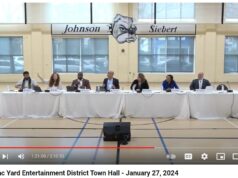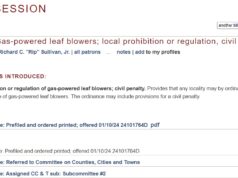by Jonathan Sokolow
In April 1963, Dr. Martin Luther King, Jr. was arrested as part of the Birmingham Campaign, an effort to bring national attention to systemic racism in one of America’s most segregated cities. As he sat in a jail cell, King wrote his Letter from a Birmingham Jail, which would become a bedrock document of the Civil Rights Movement. Speaking to leaders who, despite good intentions, failed to speak up against injustice, King famously wrote: “We will have to repent in this generation not merely for the hateful words and actions of the bad people but for the appalling silence of the good people.”
In Virginia, we are now suffering from an “appalling silence” over the environmental racism at the heart of Dominion Energy’s controversial Atlantic Coast Pipeline. And time is short. The fate of the ACP, a 600-mile, $5.5-billion, fracked-gas pipeline, together with that of the Mountain Valley Pipeline, will be decided at public hearings of the State Water Control Board on December 6-12. The pipelines also are the target of a “Water is Life Rally and Concert” in Richmond on December 2.
The appalling silence over Dominion’s plans comes from many who Dr. King would consider to be “good people.” But the silence has become deafening, particularly with the environmental racism of the linchpin of the Atlantic Coast Pipeline – Dominion’s proposed compressor station in Union Hill in Buckingham County, Virginia.
There is no excuse for this silence. The story has been told for several years in protest, in song, on film and in print – here, here, here and here – among many other places. The short version is this: Dominion Energy paid $2.5 million to buy a 68-acre parcel from the white descendants of a large tobacco producing slave plantation known as Variety Shade. It bought the land to build a massive 55,000-horsepower compressor station to service the Atlantic Coast Pipeline for 200 miles in each direction. The compressor station would run 24/7, powered by burning gas from the pipeline, and would regularly spew carcinogenic and other harmful compounds while creating noise that has been described by a landowner who lives near a compressor station as equivalent to a “747 taking off.” The population within one mile of the proposed facility – an area commonly referred to in pipeline planning documents as the “incineration zone” in case of an accident – is 85% African American. Many of those residents, as well as unknown others buried in unmarked cemeteries, are descendants of the slaves who worked that plantation and freedmen who acquired some of the land after the Civil War. Virginia’s Department of Historic Resources is considering naming Union Hill as a state Historic District and Preservation Virginia has listed it as a “Most Endangered Historic Place.”
Terry McAuliffe, the outgoing governor of Virginia, has said nothing – not one word – about Union Hill. Nor has Governor Elect Ralph Northam, a medical doctor who should be all too familiar with the health effects of such a compressor station.
Meanwhile, in a remarkable, just-filed 250 page document, a coalition of dozens of environmental and community organizations, including the Sierra Club and the Chesapeake Bay Foundation, is asking the Federal Energy Regulatory Commission (FERC) to reconsider its October approval of the Atlantic Coast Pipeline. The FERC approval was rammed through by two commissioners hastily appointed by Donald Trump – who has called the ACP one of his top domestic priorities – over the strenuous objection of the only Democrat on the three member panel. The Trump appointees’ decision was widely criticized, including by Virginia Senator Tim Kaine, who pointed to the “suspicious circumstances” under which the decision was made.
The November 13 filing by the environmental groups offers the most detailed and compelling evidence to date that the Union Hill compressor station and the Atlantic Coast Pipeline overall should be rejected. And it should be rejected not just because construction and operation of another massive fracked-gas pipeline will worsen climate change and cause lasting damage to Virginia’s land and water, but also specifically because of the health and other dangers posed to all people who live in the pipeline’s path — and particularly to communities of color. Virginia’s leaders – including Democrats who presumably do not want to be complicit in an act of environmental racism that affects people’s health – should pay attention to the evidence of the health effects of the proposed compressor station as discussed in the FERC filing. For example:
- Study of the population around the Buckingham compressor station shows that “many elderly residents report suffering from chronic respiratory ailments such as asthma, Chronic Obstructive Pulmonary Disease (COPD), bronchitis, allergies, and other unspecified heart and lung ailments.”
- In addition, “many of these residents report high blood pressure, heart disease, diabetes, and other ailments that would make them particularly susceptible to the pollution of the compressor station. A number of children were reported to suffer from asthma and other chronic lung diseases as well.”
- “African Americans are more than twice as likely as white Americans to live near sources of harmful air pollution and have suffered disproportionately from respiratory sickness as a result. Putting the compressor station in this predominately African American community will compound this legacy of concentrating environmental harms in poorer communities and communities of color.”
- “The gas turbines for the Buckingham compressor station would run nearly continuously throughout the year to maintain pressure” and according to FERC’s own data, would result in a 40% increase of exposure to fine particulate matter over a 24 hour period, which is “a significant level of increased exposure to a dangerous category of pollutants…above the World Health Organization’s threshold.”
- “At these levels, long-term exposure can cause an increase in mortality and increased serious health problems, such as respiratory ailments and cardiovascular disease.” Moreover, “even short-term exposure can cause health problems, particularly in sensitive populations like those with respiratory problems or heart disease.”
- The compressor station would increase nitrogen dioxide pollution by 54.5% in a 24-hour period and “the likely resulting increase in ozone pollution [i.e. smog] on sunny, warm days will be particularly hard on those residents who already suffer from respiratory diseases.”
The proposed Union Hill compressor station is just one window into the fact that the entire Atlantic Coast Pipeline project is infected with environmental racism.
Consider the fact that FERC previously forced Dominion to re-route a portion of the ACP away from the 80% white Norwood-Wingina Rural Historic District because of concerns about the impact on the “social and cultural aspects” of that community, but gave no such consideration to Union Hill.
Consider the fact that federal law, including an Executive Order signed by Bill Clinton in 1994, mandates that federal agencies include environmental justice analyses in their reviews, yet Trump’s FERC boldly claims that it is “exempt” from that requirement.
Consider the fact that another ACP compressor station proposed by Dominion is in a census tract in Northampton County, North Carolina that is 79% African American.
Consider the fact that the pipeline would run through Nash County, North Carolina, which has an Hispanic population that is about three times the state average, as well as Robeson County, North Carolina, which is more than 50% Native American, particularly of the Lumbee Tribe, and more than 80% Native American in some areas.
Consider the fact that the Native American tribes directly in the pipeline’s path include the Coharie and Haliwa-Saponi in North Carolina and, in Virginia, the Monacan, Chickahominy, Eastern Chickahominy, Nansemond, and Nottoway nations.
Consider the fact that Dominion placed the town of Garysburg, North Carolina, which is 95% African American, in what is referred to as the “incineration zone,” because it would be obliterated in an accident.
Consider the fact that FERC’s own data showed that 64% of the communities targeted by the ACP raise “environmental justice concerns because of significantly larger percentages of minority or impoverished communities (or both) within one mile of the pipeline route” and that the pipeline would “traverse regions of Eastern North Carolina and Tidewater Virginia that are among the most ethnically and racially diverse and among the poorest regions in their respective states.”
It is long past time for Virginia’s leaders to break their appalling silence on Union Hill. In recent months, elected officials from both parties called on Virginia’s Department of Environmental Quality to fix its broken review process. During the recent election campaign, dozens of candidates for the Virginia House of Delegates, joined by Justin Fairfax, the now Lieutenant Governor-Elect, announced their opposition to the pipelines and many of those leaders, now elected, have courageously continued to speak out.
Just within the past few weeks, the second largest newspaper in North Carolina came out against the ACP, and the largest paper in West Virginia announced its opposition to the Mountain Valley Pipeline. More than 1,000 residents of the Wintergreen resort in Virginia went on offense, getting ready to sue Dominion to block condemnation of their property and in West Virginia, a county board of supervisors voted to block one of the compressor stations for the MVP, forcing the pipeline company to sue the Board itself.
The momentum against these pipelines is building. Now, all people of good will can help break the silence by attending the Water is Life Rally and Concert in Richmond on December 2, by writing or calling their elected representatives or by taking any of the easy actions outlined here.
In the Letter from a Birmingham Jail. Dr. King noted that “injustice anywhere is a threat to justice everywhere.” King said that “we are caught in an inescapable network of mutuality, tied in a single garment of destiny” and that “whatever affects one directly, affects all indirectly.”
We all breathe air. We all drink water.
We are all Union Hill.


 Sign up for the Blue Virginia weekly newsletter
Sign up for the Blue Virginia weekly newsletter








